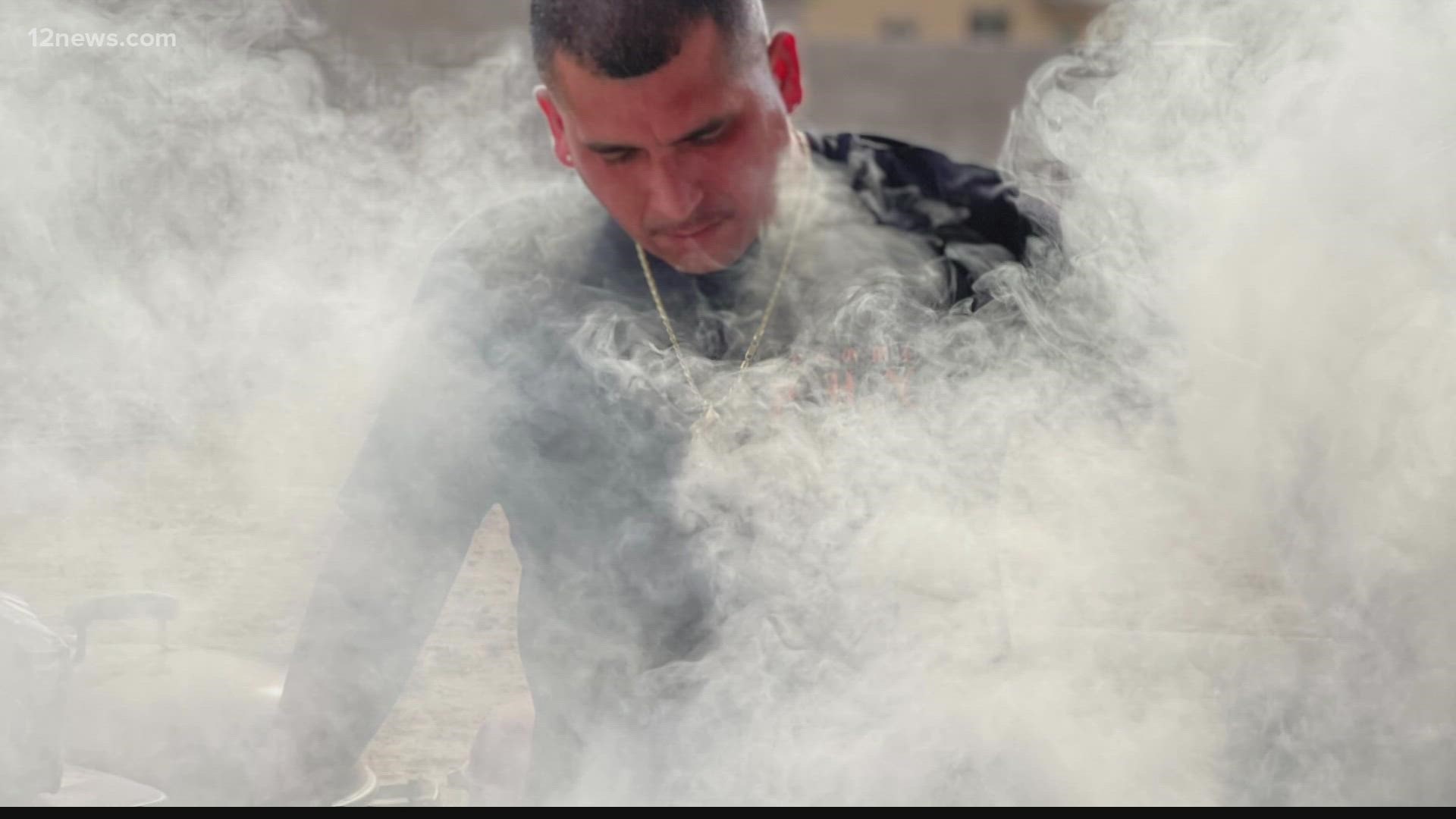MESA, Ariz. — Mario Torres survived a horrific drive-by shooting that left six injured and killed a 1-year-old boy last October.
Torres seemed to be on the road to recovery physically. Mentally though, he had more he was dealing with. Last month, Torres died suddenly.
“I tell myself he survived the shooting. He survived two serious surgeries and now he’s just gone and we don’t know why,” Felicia Torres said.
Mario Torres loved to be with family and to cook. Cooking was what brought him to Mesa a food truck on the night of October 16.
Police said Larry Miller and Chazmon Washington were involved in a fight outside of an outdoor taco shop before returning to open fire on the crowd.
Four children, ages 1 to 16, were shot, as well as three adults. One-year-old Sebastian Duran died as a result.
Mario Torres was hit in the bladder. His wife said he face-timed her on his way to the hospital.
“When he said 'I got shot,' my heart just dropped,” Felicia Torres said.
Mario Torres went through two life-saving operations, but his recovery was far from easy.
“Mario is such a manly man. And for him not to do the things he is used to doing, it really frustrated him," Felicia Torres said. “He would always tell me, 'It feels like something is wrong."
Felicia Torres said she had to convince him regularly that he was not a burden to the family.
“You can’t see a brain injury. You can’t know what that person is going through,” Laura Stewart, a clinical psychologist, said.
Stewart said Post-Traumatic Stress Disorder (PTSD) from events like this is common. Each person is impacted differently by different triggers.
She said if someone is experiencing nightmares and showing symptoms for more than 30 days, it is time to get professional help.
According to Stewart, the brain physically changes when someone is suffering from PTSD.
“The brain just changes the way it functions. It doesn’t function like it did before. It’s always looking for a threat. It always feels like it needs to be in fight or flight,” Stewart said. “It can never calm down.”
Calming down was a problem for Mario Torres. Felecia said her husband would get nervous while shopping for groceries or when he heard fireworks.
“'Did I hear something at the front door? Is there something in the backyard?' Always a sense of fear,” Felicia Torres said.
The couple was going to a family event to cook last month. While on the road, Torres said her husband was antsy. While they were there, Mario Torres had a panic attack.
After the family gathering, Mario Torres’ immediate family headed to a hotel. While the rest of the family went out, Mario Torres chose to stay in.
Felicia Torres found her husband the next morning, blue, on the bathroom floor.
“I just put all my weight and all the strength I could in pumping his chest,” Felicia Torres said.
Her efforts were too late.
The family is still waiting on the results of an autopsy to figure out what exactly killed Mario Torres. They want to know if it was something to do with his injuries, self-inflicted or another, more random reason.
If you would like to help the family, they have a GoFundMe.
Stewart said that if you or a loved one experiences symptoms like this, it is important to get help.
If you are in need of immediate help, you can call 911 or reach the National Suicide Prevention Lifeline at 1-800-273-8255 or chat with someone online.
AHCCS Suicide and Crisis Hotlines
These Arizona Health Care Cost Containment System hotlines are offered by county by the state's Medicaid agency:
- Maricopa County served by Mercy Care:
1-800-631-1314 or 602-222-9444 - Cochise, Graham, Greenlee, La Paz, Pima, Pinal, Santa Cruz and Yuma counties served by Arizona Complete Health - Complete Care Plan: 1-866-495-6735
- Apache, Coconino, Gila, Mohave, Navajo and Yavapai counties served by Steward Health Choice Arizona: 1-877-756-4090
- Gila River and Ak-Chin Indian Communities: 1-800-259-3449
- Salt River Pima Maricopa Indian Community: 1-855-331-6432
ASU Counseling Services
ASU offers support around the clock, as well as four campus locations staffed with counselors available in person or on the phone.
Hours for campus locations:
Monday, 8 a.m. - 7 p.m.
Tuesday, 8 a.m. - 5 p.m.
Wednesday, 8 a.m. - 5 p.m.
Thursday, 8 a.m. - 7 p.m.
Friday, 8 a.m. - 5 p.m.
Downtown Phoenix: 602-496-1155
Polytechnic: 480-727-1255
Tempe: 480-965-6146
West: 602-543-8125
NAMI Southern Arizona
The National Alliance on Mental Illness in Southern Arizona offers a crisis hotline, as well as information on crisis facilities and other resources.
Crisis resources for the greater Tucson area:
If you or a loved one are in immediate crisis, call the Community-Wide Crisis line: (520) 622-6000 or 1 (866) 495-6735.
If you need to call 911, NAMI says to ask for a CIT (Crisis Intervention Trained) officer who is equipped in handling a mental health crisis situation or ask for the MAC (Mobile Acute Crisis) Team.
Click here for more information.
Walk-in crisis support is available 24 hours a day, 7 days a week at the Crisis Response Center, 2802 E District St in Tucson (South of AJo Way and Country Club)
Emerge Crisis Line for domestic violence and sexual assault victims:
(520) 795-4266 or 1 (888) 428-0101
Up to Speed
Catch up on the latest news and stories on the 12 News YouTube channel. Subscribe today.

